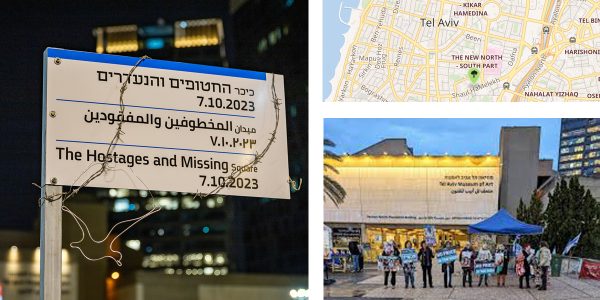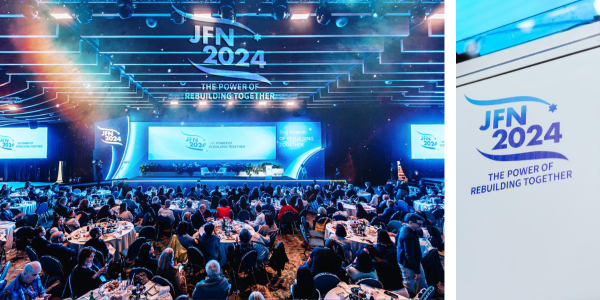By Doron Krakow
Saloon Doors at the Tel Aviv Hilton
I arrived at the Tel Aviv Museum for the opening of the Jewish Funders Network (JFN) conference—my first. Originally scheduled in Israel as part of the celebration of Israel @ 75, it became something very different—for most, a first look at Israel in the shadow of October 7. There had been murmurs about canceling. After all, travel and tourism to Israel have been decimated, and while any number of the funders expected have interests in Israel, not all consider it a priority. Truth is, there was plenty of worry that, under the circumstances, it simply wouldn’t be a draw. Those who thought so couldn’t have been more wrong.
The museum is the backdrop for Hostage Square, the place that has become the home away from home for families of those held captive by the butchers of Hamas. More than 130 men, women, and children of all ages remain in the dungeons of Gaza—168 days and counting. The families are there just about all day, every day, and not only of those still missing but also the families of those who came home and those now known to have been murdered. All of them. And all of Israel. Thousands come to speak with them, to keep them company, to sing, to pray, or just to give a hug and cry a little. I had attended the weekly vigil the evening before, together with tens of thousands of others who are there, week in and week out. It is perhaps the most magnificent demonstration of love and solidarity I have ever seen.
So, it was Hostage Square and the Tel Aviv Museum where the JFN Conference began. The auditorium was packed. Not an empty seat. All that worry about turnout turned out to be just that, worry. More than 600 people had come, making the conference the largest gathering of Diaspora Jews in Israel since that terrible, horrible day. Six hundred—a sellout—over a hundred others had been turned away once the meeting space maxed out.
Much will be written about the ensuing few days, and I encourage you to learn more. There is a lot to discover and a great deal about which to be proud. But that is not my purpose today. An unexpected thread ran through my own experience at JFN, beginning as I boarded the bus from the Tel Aviv Hilton to head to the opening.
Maya was the first one. For the past three years, she’s been a senior member of the JFN Israel team, though I knew her, years ago, as a longtime member of the Young Judaea (YJ) staff in Israel and then as a shlicha (emissary) in the United States. Scanning the large hall in search of a place to sit, I saw another old friend. Elli heads programs for a major French foundation focused on leadership development, among other priorities. He, too, was a member of the Young Judaea team, a former shaliach, and then head of its young adult community center in Jerusalem.
Thus began a series of such encounters. Unexpected but, in retrospect, not surprising. Rachel had also been on the YJ team, spending years heading summer programs in Israel. Today, she represents a major Canadian Jewish federation. Next was Alon. He spent more than 20 years with YJ, rising to become its deputy director, a tenure that included three years on shlichut in New York working with college students. Today, he heads an Israel-based non-profit dedicated to strengthening Jewish peoplehood. Sigal, who was with YJ for thirteen years, now serves as Executive Director of JFN in Israel.

There were others, naturally. More fellow travelers from those years, still based in the U.S. – representing their current organizations or foundations. Barry, Mark, Thom, Sharon… I may have missed a few at what turned out to be a wonderful reunion with a group of people who, back in the day, were part of a shared effort to mold and inspire a new generation of proud Jews—to connect them to Israel and Israelis and foster a lifelong commitment to one another, to Zionism, and to the Jewish people. Seems like it worked—on us.
That got me thinking about this moment and the crisis that brought us together this week with participants from the U.S., Canada, Mexico, the U.K., France, Australia, and elsewhere, along with an influential cadre of Israeli funders, leaders, and practitioners. The assault on Israel and the ongoing war have resulted in a huge upsurge in philanthropic commitment. More than a billion dollars already from North America alone, continuing a proud tradition of Diaspora Jewish support in times of strife.
But it’s different this time. Strife is a very real fact of life for Jews across the Diaspora, too, as soaring antisemitism has created a climate of fear and uncertainty. Philanthropy has a part to play in this part of the crisis, too, and it’s already responding, but our problems are not simply matters of money, programs, or infrastructure. They are also a function of personal and communal fortitude, resilience, and determination—attributes not always a strong suit.
There’s the rub. This is precisely the way we describe Israelis—time after time throughout the years, but perhaps never more than during these last terrible months. So, the JFN conference, which gathered funders in Israel to help shape their understanding of where and how they can assist with the recovery work to come in Israel, also provided a gathering place for Israelis who have a unique understanding of Diaspora Jewry.
My friends from Young Judaea, after extensive engagement with American and Canadian Jews, often including years working in the Diaspora, have risen to key positions in Israeli society through organizations dedicated to building on those same connections. Today, perhaps, they can be the leading edge of something altogether different in a time of crisis—both here and there. A bilateral engagement beyond the tried-and-true provision of philanthropy to Israel. A new and dynamic commitment to draw upon Israeli experience to assist North American communities suddenly in unfamiliar and uncomfortable territory.
These old friends are emblematic of a far larger cadre of Israelis whose lives and work have been shaped by experiences in Diaspora communities or through work with Diaspora organizations and programs. They’re there, in their legions. They know and understand us and are often in positions of influence to build and evolve response scenarios that could prove as critical to our capabilities and fortitude in the face of growing fear and unease, as our philanthropy has proven to their efforts in Israel.
Not long ago, we spoke of twin peaks in the Jewish world. A thriving “Israel at 75” and the largest and most successful Diaspora in our history. Today, both are in the crosshairs and each should bring its best to bear for one another. After all, isn’t that the foundation of peoplehood?
Am Yisrael Chai | עם ישראל חי
Shabbat shalom | שבת שלום

Doron Krakow
President and CEO
JCC Association of North America
Reader Interactions